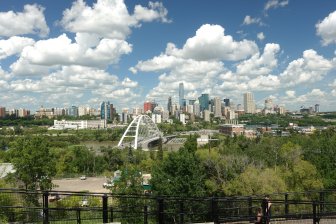Canada is often thought of as a global leader for LGBTQ2 rights, but data shows anti-queer protests are spiking across the country and that hate is seeping into Canadian politics, too.

This year a U.S. data tracker found more anti-queer demonstrations in Canada than ever before. And for the first time ever, the federal government has allocated $1.5 million in funds to boost security at Pride events across the country this June as safety threats loom.
“We’re dealing with probably some of the scariest forms of pushback against LGBTQ2 rights, in particular to those who are transgender and non-binary,” says Debbie Owusu-Akyeeah, the executive director of the Canadian Centre for Gender and Sexual Diversity.
“We’re seeing a much more coordinated attack in areas that we’ve never seen before, including school board meetings, including Pride events, whether it’s drag story time – these are all new tactics that we’re seeing.”
But during this time of increased intolerance, when LGBTQ2 political representation may be needed most, advocates and politicians say increased hostility and polarization are pushing queer people away from Parliament Hill.

There are currently nine openly queer members of Parliament out of the 333 serving Canadians federally – more than any other time in history. But that representation is set to decrease when NDP MP Randall Garrison retires this summer.
First elected in 2011, Garrison is a proud openly gay man who has championed queer and trans rights across partisan lines throughout his term as Canada’s first 2SLGBTQI+ Rights critic. He says although Canadian politics has come a long way since his early days, more representation is still needed.
“A more diverse Parliament makes better laws and better represents Canadians,” he says. “If we were represented by percentage of the population, then there’d be three times as many out gay MPs, so there’s some work to do.”
At the beginning of Garrison’s political career, queer politicians were few and far between which meant he shouldered frequent discrimination.

But as he closes out his fourth consecutive term, Garrison says he’s witnessing history repeat itself with a rise in hate aimed at LGBTQ2, Indigenous and racialized people and women.
“When I was first elected I faced an onslaught of threats, which caused us to involve the police, and that had basically gone away until the pandemic,” he says. “And now that level of rhetoric and threat has increased again.”
Other queer MPs are also sounding the alarm about LGBTQ2 inclusivity sliding backwards in Canada.

Blake Desjarlais, the first two-spirit MP elected to Canada’s parliament and co-chair of the first-ever Canadian Pride Caucus, says things have gotten worse since he joined Parliament.
“The rising issue of violence and hatred towards the queer community is becoming an issue that we would have never have thought, honestly five years ago, that we would be dealing with at this time,” he says. “We thought that we would have kind of overcome this.”
Desjarlais credits Garrison with being a fierce mentor and friend during times of need.
“When I first got elected, he was ecstatic… I remember the first thing he said was ‘I’m not the only one now,’” Desjarlais says. “He’s taught me to navigate through that kind of level of hatred – especially amongst my own colleagues, especially amongst other elected officials – and that is something I’ll continue to take with me for my entire life.”
“I know Randall is not going anywhere. He’s going to be one phone call away, and that gives me solace that I won’t be alone.”
Owusu-Akyeeah says allies need to take action to make politics more inclusive — not just for LGBTQ2 people, but also for members of other underrepresented minority groups.
“We need to see some strong political will… that will enable a culture for people who are like myself, who are Black women, who are in the LGBTQ2 community, to feel safe enough to want to even take on a leadership position,” she says. “Right now, that’s not what’s happening. There are many 2SLGBTQ+ people that I know of who don’t feel comfortable about the idea of wanting to run because they know that it will expose them.”
Desjarlais says he’s hopeful that the path Garrison has paved in Canadian politics will make room for more queer politicians, perhaps even the first trans MP.
“Hopefully, when we have one of our community members retire, we can bring in 10 more members of the community to help us out,” he says. “So I can’t wait for whoever decides to run in the next election.”



Comments